| Longtailed duskdarter | |
|---|---|
_(25368467958).jpg.webp) | |
| Male | |
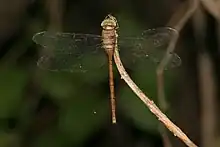 | |
| Female | |
| Scientific classification | |
| Domain: | Eukaryota |
| Kingdom: | Animalia |
| Phylum: | Arthropoda |
| Class: | Insecta |
| Order: | Odonata |
| Infraorder: | Anisoptera |
| Family: | Libellulidae |
| Genus: | Zyxomma |
| Species: | Z. petiolatum |
| Binomial name | |
| Zyxomma petiolatum | |
 | |
| Synonyms | |
|
Zyxomma sechellarum Martin, 1896 | |
Zyxomma petiolatum,[3] known by the common names long-tailed duskdarter,[4] brown dusk hawk[5][6] and dingy duskflyer, is a species of dragonfly in the family Libellulidae.[7] It is widespread in many Asian countries,[8][1][9] New Guinea, northern Australia and islands in the Pacific.[10]
Description and habitat
It is a medium-sized chocolate-brown colored dragonfly with emerald-green eyes. Female is similar to the males. It breeds in small pools, ponds, swamps and slow flowing rivers. It is crepuscular but may also be active during overcast days. Usually seen in the evening as an extremely rapid flyer, flying low over water-bodies, hawking midges and mosquitoes. In daytime it roosts among vegetation and can be difficult to find.[11][12][13][5][6]
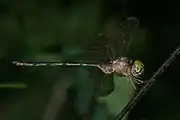 Male side view
Male side view_(15314926378).jpg.webp) Young female
Young female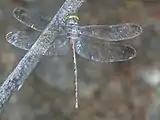 Adult female
Adult female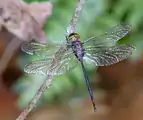 Adult male
Adult male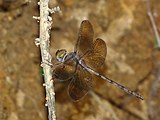 Female with dark wings
Female with dark wings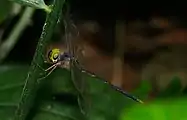 Male
Male.jpg.webp) Female wings
Female wings.jpg.webp) Male wings
Male wings
See also
References
- 1 2 Subramanian, K.A.; Dow, R.A. (2017). "Zyxomma petiolatum". IUCN Red List of Threatened Species. 2017: e.T167216A83384652. doi:10.2305/IUCN.UK.2017-1.RLTS.T167216A83384652.en. Retrieved 20 November 2021.
- ↑ Rambur, Jules (1842). Histoire naturelle des insectes. Névroptères (in French). Paris: Librairie Encyclopédique de Roret. pp. 534 [30] – via Gallica.
- ↑ Paulson, D.; Schorr, M.; Abbott, J.; Bota-Sierra, C.; Deliry, C.; Dijkstra, K.-D.; Lozano, F. (2023). "World Odonata List". OdonataCentral, University of Alabama. Retrieved 14 Mar 2023.
- ↑ Theischinger, Günther; Hawking, John (2006). The Complete Field Guide to Dragonflies of Australia. Collingwood, Victoria, Australia: CSIRO Publishing. p. 290. ISBN 978 0 64309 073 6.
- 1 2 "Zyxomma petiolatum Rambur, 1842". India Biodiversity Portal. Retrieved 2017-02-18.
- 1 2 "Zyxomma petiolatum Rambur, 1842". Odonata of India, v. 1.00. Indian Foundation for Butterflies. Retrieved 2017-02-18.
- ↑ "Species Zyxomma petiolatum Rambur, 1842". Australian Faunal Directory. Australian Biological Resources Study. 2012. Retrieved 26 February 2017.
- ↑ Odonata: Catalogue of the Odonata of the World. Tol J. van , 2008-08-01
- ↑ K.A., Subramanian; K.G., Emiliyamma; R., Babu; C., Radhakrishnan; S.S., Talmale (2018). Atlas of Odonata (Insecta) of the Western Ghats, India. Zoological Survey of India. pp. 403–404. ISBN 9788181714954.
- ↑ Theischinger, Gunther; Endersby, Ian (2009). Identification Guide to the Australian Odonata (PDF). Department of Environment, Climate Change and Water NSW. p. 241. ISBN 978-1-74232-475-3.
- ↑ Subramanian, K. A. (2005). Dragonflies and Damselflies of Peninsular India (PDF).
- ↑ C FC Lt. Fraser (1936). The Fauna of British India, including Ceylon and Burma, Odonata Vol. III. Red Lion Court, Fleet Street, London: Taylor and Francis. pp. 409–410.
- ↑ C FC Lt. Fraser (1924). A Survey of the Odonate (Dragonfly) Fauna of Western India and Descriptions of Thirty New Species (PDF). p. 443.
External links
![]() Data related to Zyxomma petiolatum at Wikispecies
Data related to Zyxomma petiolatum at Wikispecies
![]() Media related to Zyxomma petiolatum at Wikimedia Commons
Media related to Zyxomma petiolatum at Wikimedia Commons
